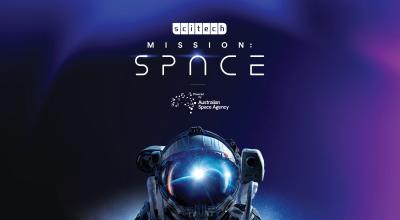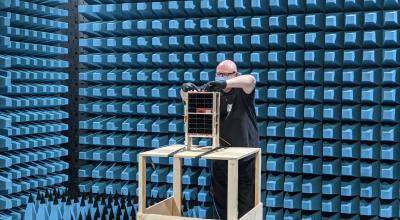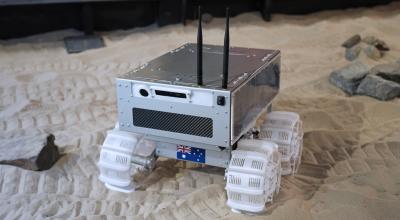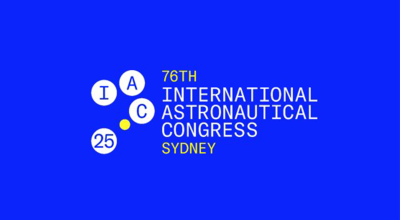The Australian Space Agency signed a Memorandum of Understanding with the Western Australian Government which outlines key areas where the Australian Space Agency can work with WA to support business and academia.
Senior officials from the Australian Space Agency, Federal Government and WA Government
Read the full statement
The Commonwealth of Australia as represented by the Australian Space Agency, part of the Department of Industry, Innovation and Science, (hereafter referred to as the “the Agency”); and the State of Western Australia through the Department of Jobs, Tourism, Science and Innovation within the Western Australian (WA) State Government, (hereafter referred to as “JTSI”); hereinafter referred to individually as “Participant” or collectively as “Participants”,
DESIRE TO BUILD on the co-operation already established between the Participants;
RECOGNISING the wishes of the Participants to mutually grow the size, scope, sustainability, number of jobs and investability of the national space industry capability;
CONSIDERING the positive contribution that co-operation in supporting the development of infrastructure, science, research, technology, services and applications will bring to all industry organisations as well as academic and research institutions across the space sector;
REFLECTING that the Australian Civil Space Strategy 2019-2028 is a framework for the development and growth of the Australian space industry over ten years; underpinned by four strategic pillars: International; National; Responsible; and Inspire. Under these pillars the strategy endeavours to help realise opportunities and address challenges by opening doors internationally; increasing national space capability; promoting responsible regulation, risk and space culture; and building the future workforce. The Strategy sets a path for the Agency to triple the size of Australia’s space sector to $12 billion and create another 20,000 jobs by 2030;
RECOGNISING that the Agency’s purpose is to transform and grow a globally respected Australian space industry that lifts the broader economy, inspires and improves the lives of Australians – underpinned by strong international and national engagement;
RECALLING that the Agency has seven National Civil Space Priority Areas including communications technologies and services; position, navigation and timing infrastructure; space situational awareness and debris monitoring; leapfrog research and development; Earth observation services; robotics and automation on Earth and in space; and access to space;
RECALLING that the Agency is responsible for whole-of-government coordination of civil space matters and is the primary source of advice to the Australian Government on civil space policy including: providing national policy and strategic advice on the civil space sector; coordinating Australia’s domestic civil space sector activities; supporting the growth of Australia’s space industry and the use of space across the broader economy; leading international civil space engagement; administering space activities legislation and delivering on our international obligations; and inspiring the Australian community and the next generation of space entrepreneurs;
RECOGNISING the WA Government’s commitment to working collaboratively with the Agency and industry to support the growth and development of the space sector in WA and Australia more broadly;
RECOGNISING the WA Government has worked to encourage partnerships and engagement with Australian and international participants of the space ecosystem to build economic value for WA and broader Australia. Noting that WA has a continuing international space history with the European Space Agency (ESA), NASA, and the Swedish Space Corporation;
RECOGNISING the WA Government is focused on supporting and enhancing the space industry in the State to create jobs, diversify the economy and increase innovation. Noting WA’s existing capability in space operations, particularly ground-based satellite and deep space communications; space situational awareness; data processing, analysis and supercomputing; the application of space-sourced data; and remote asset management in extreme environments;
That WA is host to space operations and infrastructure of, for example, satellite ground stations for Optus satellites, Telstra and NBNCo, many of which are located at the Perth International Telecommunications Centre; ground stations including the ESA deep space tracking station at New Norcia, the Swedish Space Corporation Western Australian Space Centre at Yarragadee; the optical space surveillance facility at Learmonth; the space surveillance facilities at Exmouth; and the Airbus Zephyr flight base at Wyndam;
That WA is host to supporting operations and infrastructure of, for example, the Pawsey Supercomputing Centre; Curtin University’s Space Science and Technology Centre; the International Centre for Radio Astronomy Research; the Cyber Security Cooperative Research Centre; the WA Data Science Innovation Hub; the Australian International Gravity Observatory; the Murchison Widefield Array telescope, and the Australian SKA Pathfinder telescope at the Murchison Radio-astronomy Observatory.
HAVE REACHED THE FOLLOWING UNDERSTANDINGS:
1. Purpose
1.1 The purpose of this Memorandum of Understanding (MOU) is to:
- provide a framework for mutual understanding between the Participants regarding common areas of interest and reviewing major areas of future cooperation to develop the space industry;
- facilitate the interchange of information in areas of mutual interest; and
- nominate relevant points of contact for both Participants.
2. Areas of Cooperation
2.1 Subject to the laws and regulations applicable to them, the Participants, through consultation, will decide upon the specific items and scope of cooperation within the framework of this MOU. The proposed collaborative activities are as follows:
- Participants will facilitate collaboration as appropriate in WA and Australian national space sectors, including:
- working with JTSI in several focused sectors including:
- space communications technologies and services, including optical communications;
- the application of Earth observation data;
- positioning, navigation and timing infrastructure;
- space situational awareness and debris monitoring;
- robotics, artificial intelligence (AI), Internet of Things (IoT), advanced networking and remote asset control for Earth and space;
- mission support services for deep space and other missions;
- strengthening partnerships with international space agencies, including through activities relating to ESA’s New Norcia facilities;
- space data analysis and processing;
- space engineering and small satellite development;
- satellite/pseudo satellite launch sites; and
- the intersection of space activities with fields such as cybersecurity, astronomy, and defence science.
- supporting the development of space industry skills and workforce capability;
- supporting and promoting the emerging space start-up ecosystem in WA both nationally and internationally;
- collaborating with the WA Government to promote and leverage WA’s growing space capabilities, infrastructure and international networks to facilitate the growth of the space sector, including leveraging WA’s expertise in remote operations to advance autonomous activities for the space sector;
- supporting WA businesses and academia in the participation in international space missions, and;
- collaboratively promoting Australian space activities to inspire interest by students and the broader community about space and STEM more broadly.
- Participants will jointly identify suitable projects of common interest that can be supported and developed by both Participants. Other areas of cooperation may be identified by mutual consent of the Participants.
3. Financial and legal provisions
3.1 The Participants acknowledge that this MOU will place no financial, legal or other type of commitment on either Participant.
4. Implementation
4.1 The Participants will arrange meetings by mutual consent to review progress on this MOU.
4.2 The Participants acknowledge that the State and Territories Space Coordination Committee, as defined in the Agency’s Charter, will be used as the forum to review the Agency’s and all States and Territories progress to supporting the growth of Australia’s national space sector.
5. Amendment
5.1 This MOU may be amended by mutual consent of the Participants. The Participant wishing to make an amendment will notify the other in writing. Any amendment will take effect when each Participant has notified the other in writing of its consent to the amendment.
6. Status
6.1 Nothing in this MOU is intended to create any legally binding relationship between the Participants, nor is it intended to have any legal or binding effect on either Participant.
6.2 This MOU does not confer on the Participants any benefit or advantage in relation to any government contract, tender process or transaction or any application for a license, permit or other authority under government legislation.
6.3 This MOU will be without prejudice to the cooperation of either Participant with other states, territories, space agencies or any other entity.
7. Duration and termination
7.1 This MOU will come into effect on the date of signature by both Participants and will continue in operation until terminated by either Participant giving one months’ written notice to the other.










